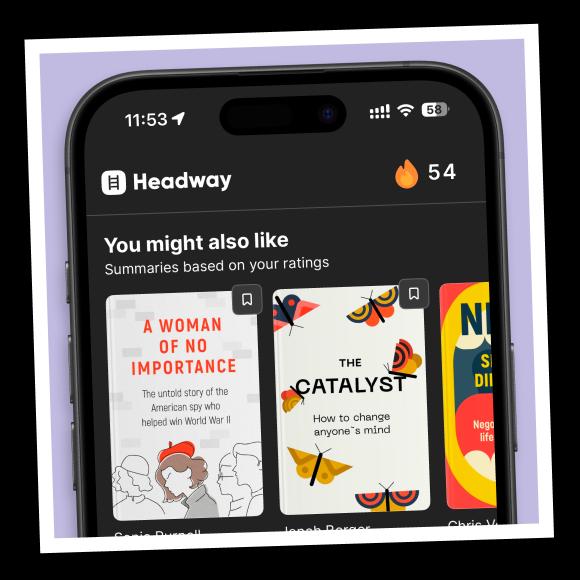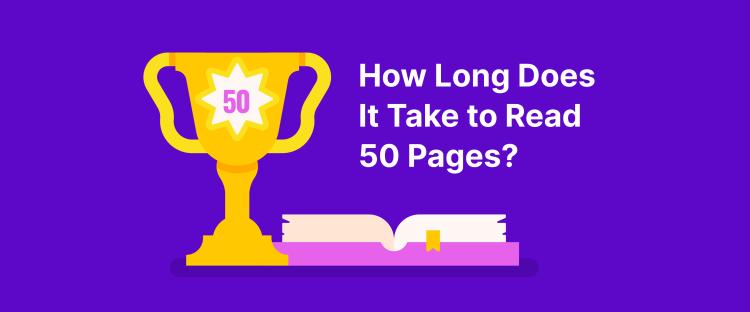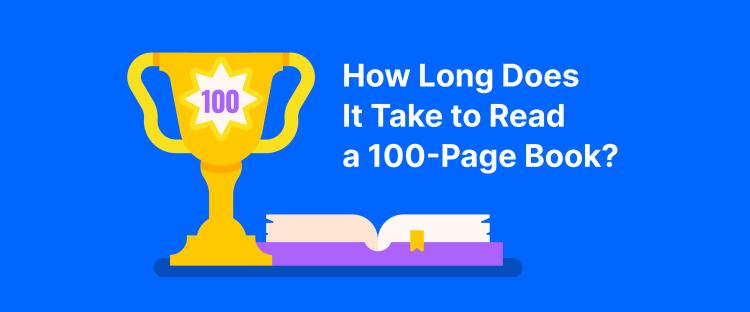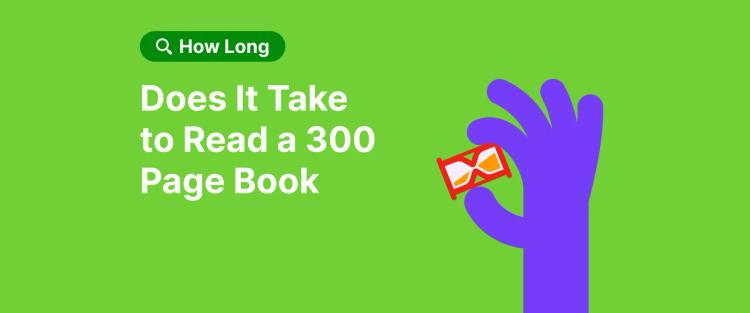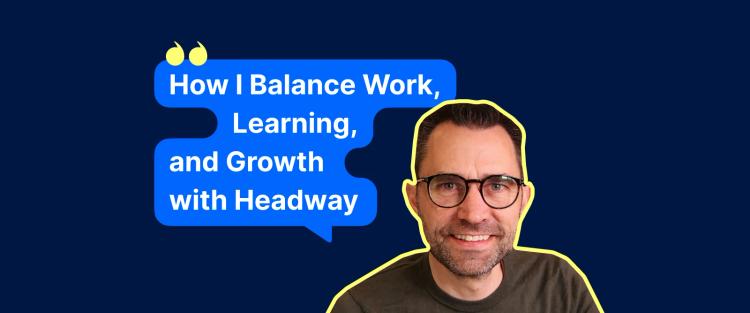Most people aim to read between 12 and 24 books a year — that’s 1–2 books a month. However, your ideal goal depends on your available time, reading speed, and interest.
This article will help you set a realistic target and offer tips to read lots of books and maybe even become a bookworm by the end of the year. By the end, you'll have the tools to decide how many books you should read in a year and how to get started.
But before we explore how many books you should aim to read in a year, let’s look at a tool to instantly get your reading rate up. The Headway app is a great solution for people wanting to read more and improve themselves through accessible, bite-sized book summaries.
Try the Headway app and expand your knowledge in just 15 minutes a day!
Quick summary:
The average person reads about 12 books per year, or 1 book per month.
A realistic goal is 12–24 books a year, depending on your time, pace, and interest.
Your reading speed matters — the average is around 250 words per minute.
You can read or listen to more books using the Headway app, which offers 15-minute summaries.
Set personal reading goals by factoring in your lifestyle, habits, and schedule.
Keep reading for the full list of tips!
How do you decide how many books to read in a year?
Hopefully, by now, you’ve come to a point where you’re no longer asking yourself ‘if’ you should be reading more and rather how.’ That in and of itself is a great first step — it shows that you’re open to self-improvement and have the potential to grow. Good work!
When trying to make reading a part of your life, it’s important to realize that not everyone should have the same goals. Sure, you could Google ‘how much should I be reading’ and get a broad number from some blog, but that wouldn’t necessarily fit your specific situation.
It’s always best to personalize your reading goal to your own lifestyle. Here are some tips for how to do so.
📘Read more books in less time with Headway book summaries!
1. Measure your book reading speed
Reading speed may seem like a little thing, but it can significantly impact the number of books you can get through in a year. Often measured in schools, the rate refers to how many words a person can go through and fully understand in a minute. The average American has a reading speed of 250 w/m, although this can vary among a greater range of 200 to 300.
Average reading speeds:
Slow reader: ~150 wpm
Average reader: ~250 wpm
Fast reader: ~400+ wpm
Measuring your reading speed is a great thing you can do to gauge a realistic yearly reading goal effectively. Many online tests let you do it for free — try a few and see how you score.
It’s important to remember that a high rate doesn’t necessarily mean you’ll finish books in less time. These tests often focus on speed alone and don’t account for the reflection or dwelling involved in reading more complex text. It’s natural to pause, flip pages, and re-read when going through a novel, whereas these tests are time-oriented.
You also don’t want to misrepresent your regular speed. Trying your absolute hardest to reach a reading rate of 300 words per minute won’t do you good if you’re only comfortable at 250. Instead, aim to generate an accurate result and go from there.
Choosing a book goal from your reading speed is pretty straightforward — multiply your rate by the time you have available. Say you’re comfortable with a 250 w/m reading speed and have an hour to spare each day. That’s 15,000 x 365 = 5,475,000 words per year. From there, you can determine how many books it equates to based on the length of each.
📘Get the Headway app and level up your reading skills!
2. Get Headway to simplify learning and reading
Reading more books is a great goal anyone can benefit from, but in all honesty, it isn’t something everyone can do. From personal commitments to school, work, and social gatherings, many people find life to be busy enough as it is.
Headway is an innovative app designed with the modern learner in mind. It comprises a large library of the world’s top titles, broken down into short, easily digestible chunks. Simply pick a book and get an understanding of its key points in minutes without having to sacrifice other parts of your day.
📘Stop scrolling, start growing with the Headway app!
3. Consider your interests and habits
Reading should never be a chore, even when you’re setting annual book goals. Try to match your chosen books with your interests and habits. Otherwise, you’re more likely to put down the book after a few chapters.
If you’re unsure what type of books to choose, think back to the stories and topics that resonated with you in the past. Or, if you’re open to something new, look at what other readers are saying online — both in book reviews and on social media. Your peers will often be able to help you find stories that fit with what you’re looking for.
Also, keep in mind the type of book format you prefer. Do you like physical copies, e-books, or audiobooks? Knowing ahead of time will make it much easier to decide how many books you’ll be able to get through in a year.
📘Find more insights in Headway book summaries!
4. Reflect upon your current reading record
One of the biggest challenges people create for themselves when establishing new goals is believing that everything can change overnight. You’ll see it commonly with New Year’s resolutions — someone says they’re going to stop smoking, start exercising and quit fast food from January 1st. That’s a lot of habits to change all at once.
The same thing applies when you’re setting reading goals. It’s unrealistic to expect a drastic change immediately. You’ll start at whatever reading level and speed you’ve always been at and have to go from there.
With this in mind, take time to consider your past reading experiences when setting new book goals. What has been your average number of books read in a year? Are you looking to increase that or maintain it? It’s important to factor in the time it takes you to read and ensure that your goals are achievable.
📘Download the Headway app and become more productive, starting now!
5. Understand how your schedule affects your reading goal
Ultimately, the number of new books you’ll be able to fit into your life will depend on the schedule surrounding it. Many people are too busy to read titles from cover to cover, and that’s okay — just make sure you’re setting yourself up for success by considering existing commitments.
If you work full-time and have two kids, reading 30 books a year might not be realistic. Instead, you can adjust your goal to reading 12-15 books and carve out time whenever possible.
It’s also important to plan. Think about what you have scheduled during the year — will you take a vacation, work overtime, or host family events? Knowing what’s coming up will help you plan appropriately and ensure that your book goals are attainable.
📘Try Headway and turn reading into a self-growth habit!
6. Remember that not all books are the same
The world is full of books about love, life, tragedy, growth, management, business, and more. They come in different sizes and shapes, with varying difficulty and complexity levels.
When setting book goals, remember that not all books are created equal. Some may be longer and denser than others or require more focus and concentration to understand their content. While you should pick whatever titles interest you the most, it’s worth taking a moment to consider how difficult they are ahead of time.
📘Explore the Headway app for quick lessons from nonfiction bestsellers!
How much does the average person read?
This is a loaded question when you consider the many factors that can determine its answer. Reading is a fundamental part of modern life, something we do every day. From street signs to posters and magazines, we learned the skill growing up and haven’t stopped using it since. Some could argue that humans read so much it’s impossible to measure — after all, who could realistically stop themselves every time they read to keep track?
Average books read per year
Many adults don’t read books regularly. According to Pew Research Center, about 23% of Americans didn’t read a single book in the past year. Meanwhile, 64% read at least one book, and the national average is around 12 books per person per year.
Breakdown by demographics:
Women: 15.7 books/year
Men: 9.5 books/year
Average reading time in the U.S.: 16.8 minutes/day
Age 75+: 40 minutes/day
Top global readers: India, Thailand, China (over 1 hour/day)
Why do some people read more than others?
Reading habits vary due to lifestyle, culture, interest, and socioeconomic factors. In tech-heavy regions like the U.S., attention often shifts toward screens and social media. In contrast, countries that prioritize education and literacy often show higher book engagement.
Many connected countries have seen a decline in reading popularity as technology takes hold of citizens’ attention. The rise of social media usage in the U.S. is mostly blamed for young people’s lack of interest.
Socioeconomic elements also have an impact. Reading has long been considered a key measure of education, and although it’s estimated that more than four out of five people can read worldwide, this ratio may be lower in less advanced countries.
FAQ
Is reading 20 books in a year a lot?
Yes, reading 20 books a year is more than what the average adult manages. According to surveys from last year, most people read around 12 books annually. Finishing 20 books places you ahead of the curve — especially if you’re juggling work, family, and other commitments.
For many users on Goodreads, 20 books is a common reading challenge goal. Whether you prefer a Kindle, physical books, or a mix of both, consistently reading at this pace shows you’re well on your way to becoming an avid reader. Joining a book club can also help keep you motivated.
Is reading 50 books in a year impressive?
Absolutely. Completing 50 books in a year — nearly one per week — is considered impressive, even among speed readers and Goodreads enthusiasts. This pace takes commitment, structure, and a strong reading list, often curated from favorite books, trending picks on TikTok, or lists of the best books shared in communities.
Many avid readers on Amazon or Kindle achieve this by mixing genres like science fiction, self-help, and biographies, and by incorporating audiobooks or apps with book summaries into their daily routines.
Can someone read 500 or even 1,000 books in a year?
Technically, yes — but not without some help. Reading 500 or 1,000 full-length books in a year is extremely rare and typically limited to speed readers, researchers, or those using book summary apps. Most avid readers who claim such numbers rely on Kindle highlights, physical book skimming, or apps like Headway and Blinkist to consume key takeaways in just minutes.
Others use a mix of audiobook subscriptions and podcasts to supplement traditional reading. If your bookshelf includes short reads, novellas, or nonfiction summaries, reaching a high number is more attainable — though far from typical.
How many books can you realistically read in a lifetime?
The answer depends on when you start tracking and how consistently you read. If you begin at age 20 and read 20 books per year until you're 80, that’s roughly 1,200 books over a lifetime. Goodreads makes it easy to monitor progress over the years, while platforms like Amazon and Kindle can track your reading stats automatically.
If you curate a personal reading list that includes both fun genres like science fiction and more complex nonfiction, you’ll fill a respectable bookshelf — and likely develop a strong sense of your favorite books along the way.
How many books does Bill Gates read in a year?
Bill Gates has shared through interviews, blog posts, and his own podcast appearances that he reads about 50 books per year. His recommendations often top lists of the best books in business, technology, and global development. Many of these end up in Goodreads communities, Amazon bestsellers, and Kindle collections.
Gates keeps a running reading list and reads mostly physical books, often writing notes in the margins. His approach reflects how even the busiest people can make time for reading — especially when it’s a lifelong habit, not just a goal.
How many books does the average person read a year?
Although the numbers vary over time, and between the studies that release them, it’s estimated that the average person reads 12 books each year. This can fluctuate among specific demographics, regions, and literacy levels.


